Inequality in the gig economy is nothing new. For years, millions of low-paid gig workers have been denied sick pay and health insurance by companies that intentionally misclassify them as contract workers. For companies like Uber, Lyft, Doordash, and Taskrabbit, it’s a calculated move to avoid the cost of benefits and federal payroll taxes. Unfortunately, it took a global pandemic to bring these unfair conditions into the spotlight, when under-protected workers suddenly found themselves deemed “essential.”
During the first wave of the coronavirus, many gig workers spoke up about unfair conditions and benefits inequality, including their lack of personal protective equipment, hazard pay, and sick leave. The subsequent public outcry led to some action on the part of the government. In Seattle, the city council voted in June to require food delivery companies such as Instacart and Grubhub to pay gig workers an extra $2.50 per order in hazard pay, for the duration of the Covid-19 emergency. In my home state of Massachusetts, attorney general Maura Healey recently filed a lawsuit against Uber and Lyft for misclassifying their drivers.
But these aren’t silver bullets to achieve equality for gig workers, because they do little to address a more insidious perpetrator of inequality that still lurks in the gig economy: racial bias.
It’s never as simple as “one star” or “five stars”
Like any other sector of American society, ingrained prejudices on the basis of color infiltrate the gig economy both explicitly and implicitly, impacting workers and customers alike. Let’s start with the rating systems many gig companies use to evaluate workers and customers.
Airbnb guests use reviews to assess their rental experiences, while hosts rate their guests based on interactions and adherence to rental property rules. Similarly, Uber riders rate their drivers, and vice versa. These ratings identify—and weed out—the lowest-rated vendors and customers.
But it’s never as simple as “one star” or “five stars,” because ratings are far from objective. In light of the coronavirus, ride-share drivers and riders of Asian descent, for example, have been met with outright discrimination. According to the Los Angeles Times, “in interviews and online, customers and drivers of Asian descent reported a raft of complaints, including inappropriate comments or cancellations due to their appearance or name.”
Other staggering statistics point to anti-Black racism in the gig economy. In 2015, Harvard researchers found “that [Airbnb] applications from guests with distinctively African-American names are 16% less likely to be accepted relative to identical guests with distinctively White names.” And studies show that Black passengers face longer wait times than white passengers when using ride-sharing services like Uber and Lyft.
The common denominator here is identified in a 2016 study which noted that “consumer-sourced ratings like those used by Uber are highly likely to be influenced by bias on the basis of factors like race or ethnicity.”
How to anchor ratings in objectivity
Racial bias presents a complex issue, but a multi-step approach could help address it.
First, companies could improve their rating systems for workers through statistical adjustments that account for race and other demographic factors. These adjustments could work in conjunction with a “rate the rater” metric to detect patterns of bias within repeat raters, and remove those individuals’ abilities to affect workers’ ratings negatively.
Second, ride-share companies should implement more objective measurements to rate workers. Users could assess specific elements like driver punctuality or safety on the road. Uber has been responsive to such ideas, and refined its rating system to bring more transparency for both drivers and riders by guiding how many “stars” should be given according to levels of service or experience.
These kinds of improvements could be adopted by any company that hires temporary talent or freelancers. At my company, Aquent, which specializes in staffing for the marketing and creative industries, we recently created a system to analyze and rate our recruiters to ensure they assemble diverse candidate pools. I’ve found this is a successful way to help clients achieve their diversity and inclusion goals.
Lastly, we need to put an end, once and for all, to benefits inequality by giving gig workers the workplace benefits they rightfully deserve. The US Congress has the opportunity to correct this issue now, by mandating all companies provide basic benefits—such as minimum wage, unemployment insurance, workers’ compensation, and paid sick leave—for their extended workforces.
Today, gig workers are indisputably integral to the health of the US economy. As the US reckons with its painful history and perpetuation of systemic racism, and rebuilds following the economic devastation of the coronavirus pandemic, we’re provided the opportunity to dismantle prejudiced systems and rebuild them fairly for all.
John H. Chuang is the CEO of Aquent, a Boston-based workforce services company, operating the world’s largest marketing and creative staffing firm. It has been providing comprehensive benefits to talent since 1993.
